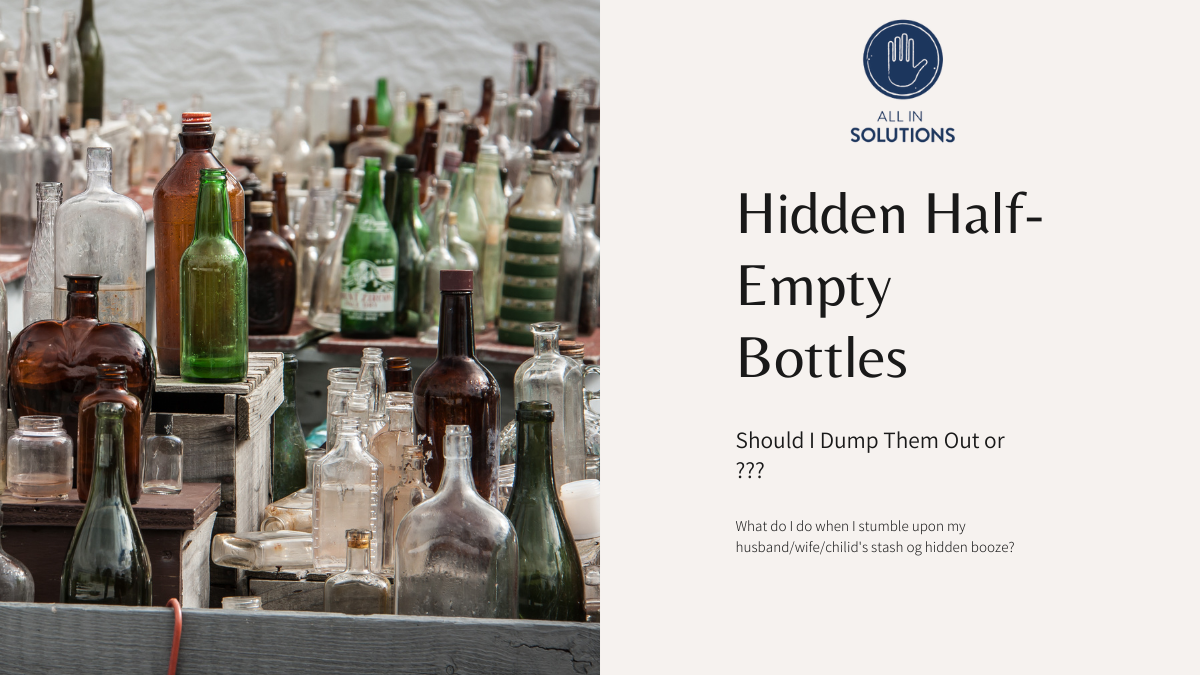This article originally appeared on: https://www.breakingthecycles.com/blog/2021/10/30/hidden-half-empty-bottles-dump-them-out-or/ and was writted by Lisa Frederiksen
Some variation of this question comes up often, “I found hidden half-empty bottles of vodka all over the house. Should I dump them out? I did that the last time, and he accused me of snooping…not trusting him.”
Hidden half-empty bottles of alcohol – what should you do if you find or go searching for them?
I remember that sick, kicked-in-the-gut feeling when I found my loved ones’ hidden half-empty bottles. Sometimes I’d collect them all and line them up on the kitchen counter – to let Alex know I knew. (For those who know my story, I have had several loved ones, male and female, who’ve abused or were dependent on alcohol, to whom I’ve given the composite name, Alex, and the pronoun, he.)
Sometimes I’d dump them out and leave the empties, and sometimes I’d grab one and track Alex down and confront him, shaking that half-empty bottle, screeching a venom filled spew – my anger, rage and hurt tumbling forth in waves.
None of it worked.
And now I know why.

People Who Don’t Have a Drinking Problem Don’t Hide Alcohol Bottles
In a nutshell… people who don’t have a drinking problem, don’t hide bottles of alcohol.
People who aren’t worried about someone’s drinking, don’t go searching for hidden bottles.
Neither one is healthy. They both need help. Yes, I needed help, and Alex needed help, and my kind of help wasn’t working.
So I’d like to use this post to share a brief overview of what I wish I’d known then – “then” being the nearly four decades I’d spent living with and loving the Alexes in my life, while trying to control how much the Alexes drank.
What You Need to Know if You Find or are Searching for Half-empty Bottles of Alcohol
The best thing you can do if you are in this situation – or approaching this situation – is to understand what you are dealing with. It is not “normal” to hide alcohol bottles, nor it is “normal” to go looking for them. So what causes people to do either? Understanding this comes in three parts, for which I’ve provided a few key links for further information.
1. Don’t confront until you understand.
- Learning how alcohol changes brain function and how changed brain function in combination with key risk factors explains how someone comes to hide alcohol bottles (they do not “want” to hide them, but their brain is overriding all rational thought because of the nature of the brain disease of alcoholism – one of the addictions). Check out NIDA’s Drugs, Brains and Behavior > Drug Abuse and Addiction (alcohol is considered a drug).
- Assessing the scope of your loved one’s drinking problem helps you appreciate how much is too much; that there really is a drinking problem. Consider using the World Health Organization’s Alcohol Use Disorders Test (AUDIT) for in informal assessment. (The actual screen [test] is on page 18. Question #3 should be read as 4 or more for women and 5 or more for men to account for U.S. standard drink measurements.)
- Understanding the impacts of secondhand drinking (the impacts of coping with your loved one’s drinking behaviors) on you explains how your brain has changed, which helps explain why you might be searching for hidden half-empty bottles. The Health Consequences of Secondhand Drinking
2. Know what you want to say. You may need time for this. You may need to talk with a therapist who specializes in what addiction or substance abuse does to family members or attend a 12-step program that supports family members and friends of people who drink too much or do some further research on what happens to the brains of family members who have been living with secondhand drinking. This post can help with this further reach and getting prepared for what you might say, What to Say to Someone With a Drinking Problem
3. When you are ready, set a date and time to talk. As difficult as this may seem to do (mostly because you want to confront them, now!), you’ll want to have a time when you know there will be no distractions, your loved one will be sober and you will be calm. This also allows you the necessary time to prepare your talking points of what you want to tell them and what you want them to do. You may also want to have a “brokered” conversation. This means having a neutral third party – not an intervention, necessarily – but a neutral, knowledgeable person to help keep the conversation from getting out of control.
To Answer the Title Question – Should I Dump Them Out or ???
No. Dumping out the half-empty bottles of alcohol will not “make” them stop drinking. It will likely add to their shame and self-loathing, however.
So the better approach is to take the above three action steps, as those can lead to real change for both your loved one and yourself. But even better would be to read my latest book published in 2019. This is not so I can sell books but so you can learn about the huge scientific advances that explains the bigger picture in layman’s terms. It’s the culmination of my years of experience as the one searching for half empty bottles (among other things 🙂 ) and the research I’ve done to understand it.

The first half covers alcohol use disorders (drinking problems) – how they’re developed and treated and what long-term recovery requires. In the case of alcohol abuse, for example, it’s possible to learn to “re-drink,” but in the case of alcoholism, it must be total abstinence from alcohol, yet in both cases, there are other brain healing aspects necessary in order to address “why” a person finds themselves drinking to these extents in the first place (e.g., trauma, anxiety, depression, social environment…).
The second half explains what happens to family members and friends and what they can do to help their loved ones, as well as what they can do to take back control of their physical and emotional health and the quality of their lives.
Bottom Line
As you understand all of this, you will be better able to focus on what you can and cannot do. In a nutshell – you can control your brain and therefore your thoughts, feelings and behaviors. You cannot control the brain of another – especially that of someone who has changed the way their brain works as a consequence of their alcohol use disorder. But know, it can and does get better. It will take time (darn!), and it will be a journey. But it is definitely well worth the effort.





